
There are feisty chickens…and then there are Guinea hens.
No, Guinea hens are not chickens, but as a chicken keeper, you ought to know about these girls and what they have to offer.
Guinea hens are becoming a popular pick with poultry keepers. Why? Because they are tougher than most roosters. They bring the attitude to the poultry party.
Don’t think of Guinea hens as aggressive chickens though. They’re not cut from the same cloth, at all. Guinea hens have something different to offer than chickens, and they have different needs too.
Guinea fowl are strong-willed, hardy, and self-sufficient birds. They aren’t the cuddly type. They’re too tough for that soppy stuff and are not barnyard buddy material.
So, what’s the appeal? Guinea fowl make the perfect homestead staff for pest management, predator detection, and even home security. Guinea hens have an egg-stra trick up their sleeves - or should I say under their butts - they also lay eggs. Birdy bonus!
Guinea hens are not ‘girly’ girls. They’re big birds with big attitudes and even bigger voices.
If predators are stressing you and your flock out, then Guinea hens are worth reading up on (nicely done, you already are), but they’re not the right solution for everyone.
If guard Guineas turn out to be a no go for you, don’t panic, there are lots of ways to keep your flock safe and well! Chickenpedia’s Poultry Predator Course should be your next read.
This blog covers what Guinea hens are good for and what they’re useless at, what they look like, how they behave, and what they’re like to keep. I’ve also shared what other Guinea hen keepers think of their gobby girls. It’s not gossiping since it’s nothing they wouldn’t say to their faces!
- What Are Guinea Hens Good For?
- Guinea Hen Pros & Cons
- Guinea Hen Vs Pet Speckled Hen
- Guinea Hens Vs Chickens
- Guinea Hens Vs Guinea Cocks
- Keeping Guinea Hens for Security
- Keeping Guinea Hens as Pest Control
- Keeping Guinea hens for Eggs
- Guinea Hen Meat
- Guinea Hens as Pets
- What Do Guinea Hens Look Like?
- How Big Are Guinea Hens?
- Guinea Hen Varieties
- Guinea Hen Colors
- Do Guinea Hens Go Broody?
- Guinea Hen Pairings
- How To Care for Guinea Hens
- What Do Guinea Hens Eat?
- How Much Space Do Guinea Hens Need?
- Guinea Hen Health
- Where To Buy Guinea Hens
GUINEA HENS - GOOD IDEA OR BAD MOVE?
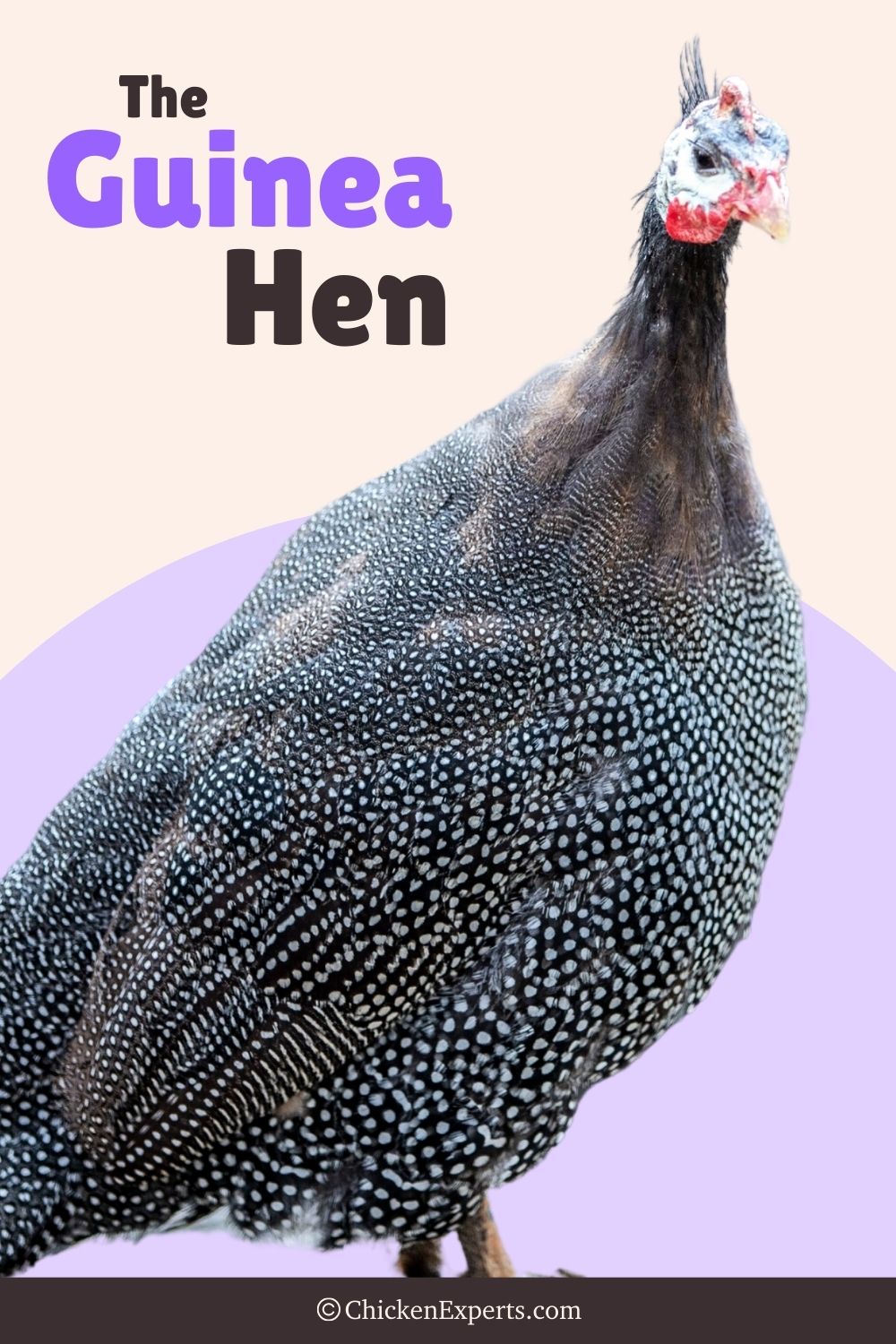
These lovely - but LOUD - ladies are either right for your homestead, or they’re totally wrong! The term ‘niche’ suits these girls well. Never take on a Guinea hen without doing your research.
Don’t let me put you off. I’m a massive fan of these functional and fearless fowl. We keep Guineas at home, and as a team, at Chicken Expert, we’ve clucked up over 25 years of experience keeping Guinea fowl. We’re all team Guinea, and we’re not the only ones…
In a recent survey with some fellow Guinea keepers, 87% said they would keep them again. They love keeping them alongside their chickens as part of their feathery family. A whopping 70% of keepers had witnessed their Guineas protecting their chickens, so consider them invaluable as far as flock security goes.
Guinea hens roam free, but 20% of Guinea keepers were frustrated by how far their ladies roam and sometimes never return. It’s traits like this that mean Guinea hens aren’t everyone’s cup of tea.
Let’s get started with a sunny-side-up attitude. Why do people (including me) love Guinea hens?
WHY BUY GUINEA HENS?
What Are Guinea Hens Good For?
Guinea fowl have a lot of uses, and the main reason that people pick Guinea hens over Guinea cocks is that they also offer a side dish of eggs🥚.
Guinea hens are mainly chosen over chickens for their skills in pest management and predator control. You’ll often find Guinea hens living happily alongside free-ranging chicken flocks.
Another reason you might like to keep Guinea hens is if you’ve tonnes of space, but not so much time, or aren’t keen on keeping your companions cooped up. They’re just more hardy, less demanding, and cheaper to feed and house than chickens are.
Guinea Hen Pros & Cons
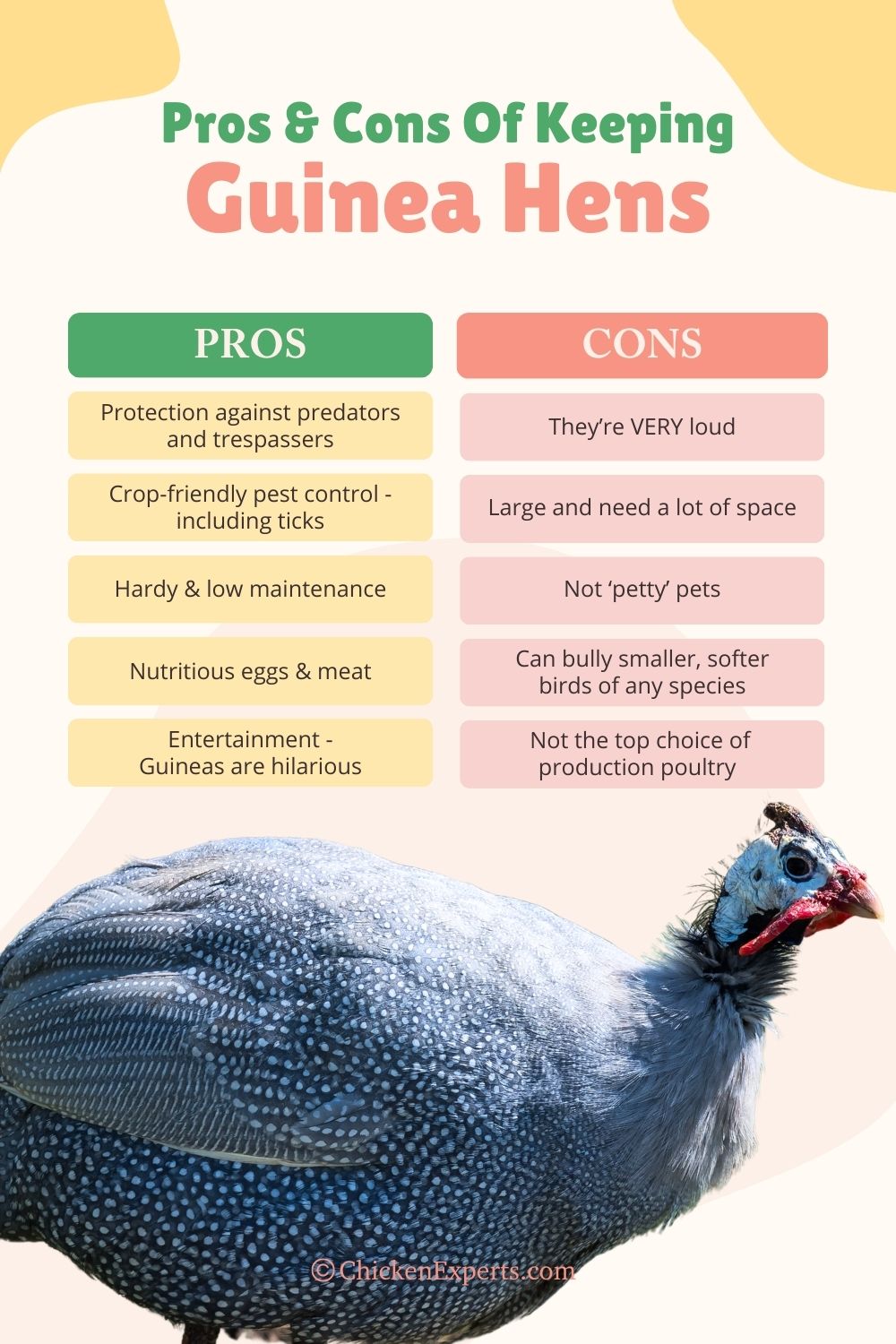
5 Top Reasons to Keep Guinea Hens
1. Protection against predators and trespassers
2. Crop-friendly pest control - including ticks
3. Hardy & low maintenance
4. Nutritious eggs & meat
5. Entertainment - Guineas are hilarious
5 Top Reasons NOT to Keep Guinea Fowl
1. They’re VERY loud
2. Large and need a lot of space
3. Not ‘petty’ pets
4. Can bully smaller, softer birds of any species
5. Not the top choice of production poultry
Guinea Hen Vs Pet Speckled Hen
Guinea hens and pet speckled hens are the same thing. Personally, I think the name 'Guinea hen' suits them better, as they are not pet-like poultry.
Guinea Hens Vs Chickens
Guinea hens are not backyard poultry pets. They look a bit like chickens, lay eggs, and they’re fowl. That’s where the similarities end.
Guineas are not as domesticated or friendly as chickens. They need to be kept free-range, not in a coop. They’re self-sufficient foragers, they’re hardy, and they’ll lay their eggs whenever and wherever they feel like it. They’re loud and they’re not interested in being petted at all.
Guinea Hens Vs Guinea Cocks
Unless you’re breeding then there’s no real reason to choose Guinea cocks over Guinea hens. These girls can hold their own!
Guinea fowl are notoriously hard to sex and the most dependable way to find the hens amongst the cocks is from their calls.
Guinea hens make a ‘buckwheat, buckwheat, buckwheat’ noise, which sounds a bit like ‘come back, come back'. Guinea cocks sound very different and make a ‘chi, chi, chi’ noise.
As they grow, males tend to be a little bit larger than females, but females tend to weigh a little more than males. It’s those lovely curves.
Not all Guineas grow wattles, but with mature guineas which do, the boys tend to have larger wattles. As Guineas don’t mature sexually until they’re 2 years old, you’ll be waiting a while to use either of these sexing methods.
This blog is the perfect Guinea hen guide, but…What about the boys?
Want to know more about Guinea Cocks? Contemplating Guinea Keets?
Cluck here for my Guinea Fowl Blog
Keeping Guinea Hens for Security
Guinea hens are popular as loud-mouthed, alert, and assertive security solutions. They’re generally quite chatty, but when they alert they scream, and the whole neighborhood knows about it, and they’ll alert to pretty much anything.
Guinea hens will alert to predators including snakes, rats 🐀, foxes, or bobcats which is great for giving your less savvy chickens a heads up to trouble.
Guinea hens are also giving guard dogs a run for the money when it comes to home security. They’ll alert to intruders, vehicles, voices, or anything out of the ordinary. If you are home alone a lot or live out in the sticks, then Guinea hens would be a great addition to your homestead.
Guinea hen owners make a very good point that an aggressive guard dog can get you prosecuted just by doing its job. There’s not the same risk with poultry security. Let them SCREAM!
Keeping Guinea Hens as Pest Control
Guinea hens are very effective for pest control purposes. Just a few Guinea hens will wipe out pesky pests like ticks, grasshoppers, spiders🕷️, caterpillars, slugs, and even scorpions and mice! Yes, chickens will feed on bugs, but not many of them will challenge a rat through choice.
Guinea hens are careful, considerate, and crop-friendly foragers. Unlike chickens or ducks, they won’t scratch up your veg patch, munch on your Marigolds, or trample your tomatoes.
Keeping Guinea Hens for Eggs
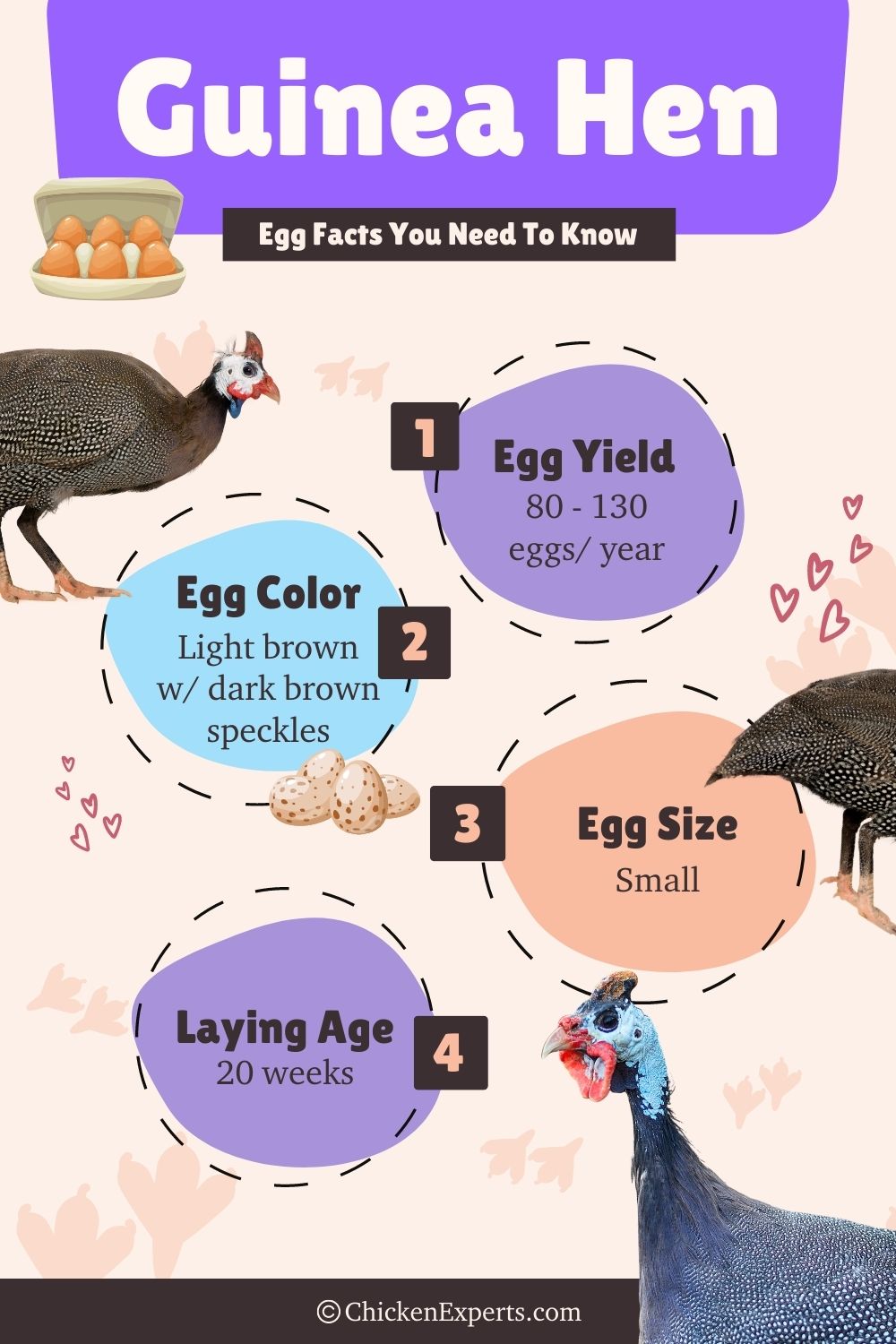
Guinea hens lay 80 – 130 small eggs a year. They’ll start laying at 20 weeks and are seasonal layers, with each clutch offering 15-30 eggs.
You’ll have to hunt for your Guinea hen eggs. Guinea hens are free-spirited, free rangers, so as you might expect, they aren’t fans of nest boxes. Guinea hens are more likely to nest amongst nature’s undergrowth.
Guinea hen eggs are smaller than chicken eggs, are always light brown with dark brown speckles, and have a pointier ‘pointy end’.
Two small Guinea eggs are said to equal one chicken egg when cooking or baking, but nutritionally, Guinea hen eggs are packed with goodness.
Guinea hen eggs are rich and tasty with yummy orange yolks. This is down to them free ranging and enjoying a varied diet, rather than down to their genetics, but who cares when they taste great!
Guinea hen eggs have a higher yolk-to-white ratio than chicken eggs, so are creamier, and great for baking.
People with egg allergies can even eat Guinea fowl eggs, and dieticians recommend them for kids and adults with protracted illnesses because of how nutritionally sound they are.
“Hypoallergenic guinea fowl eggs are beneficial for pregnant women and nursing mothers. They are helpful to people who experience stress, emotional exhaustion, and mental and physical overload. It is a good idea to include them in the diet of patients suffering from metabolic disorders, obesity, and digestive system diseases.” (Healthy Food Near Me)
Keeping Guinea Hens for Meat
Guinea hen meat is darker than chicken meat, richer in flavor, but lower in calories and fat. It’s considered a real delicacy.
“Guinea hen has a flavor that’s approachable, easy to enjoy, and almost like pheasant, but with darker and more mildly flavored meat. A favorite roasting bird in France, you can use guinea hen in place of chicken in virtually any recipe. Just take care not to overcook the lean, delicate meat.” (Dartagnan)
WHAT ARE GUINEA HENS LIKE?
Guinea Hens as Pets
Guinea hens don’t make the best pets. They’ll tolerate you, but that’s about all.
Guinea hens are highly functional fowl, which I find rather admirable. Guineas are there to do their job, and they’re happiest being left to their own agenda for the day. They’re entertaining to watch since they take alerting very seriously!
Guinea hens are so alert that their temperament is edgy, aggressive towards predators, and aloof, or mildly interested in familiar humans.
What Do Guinea Hens Look Like?
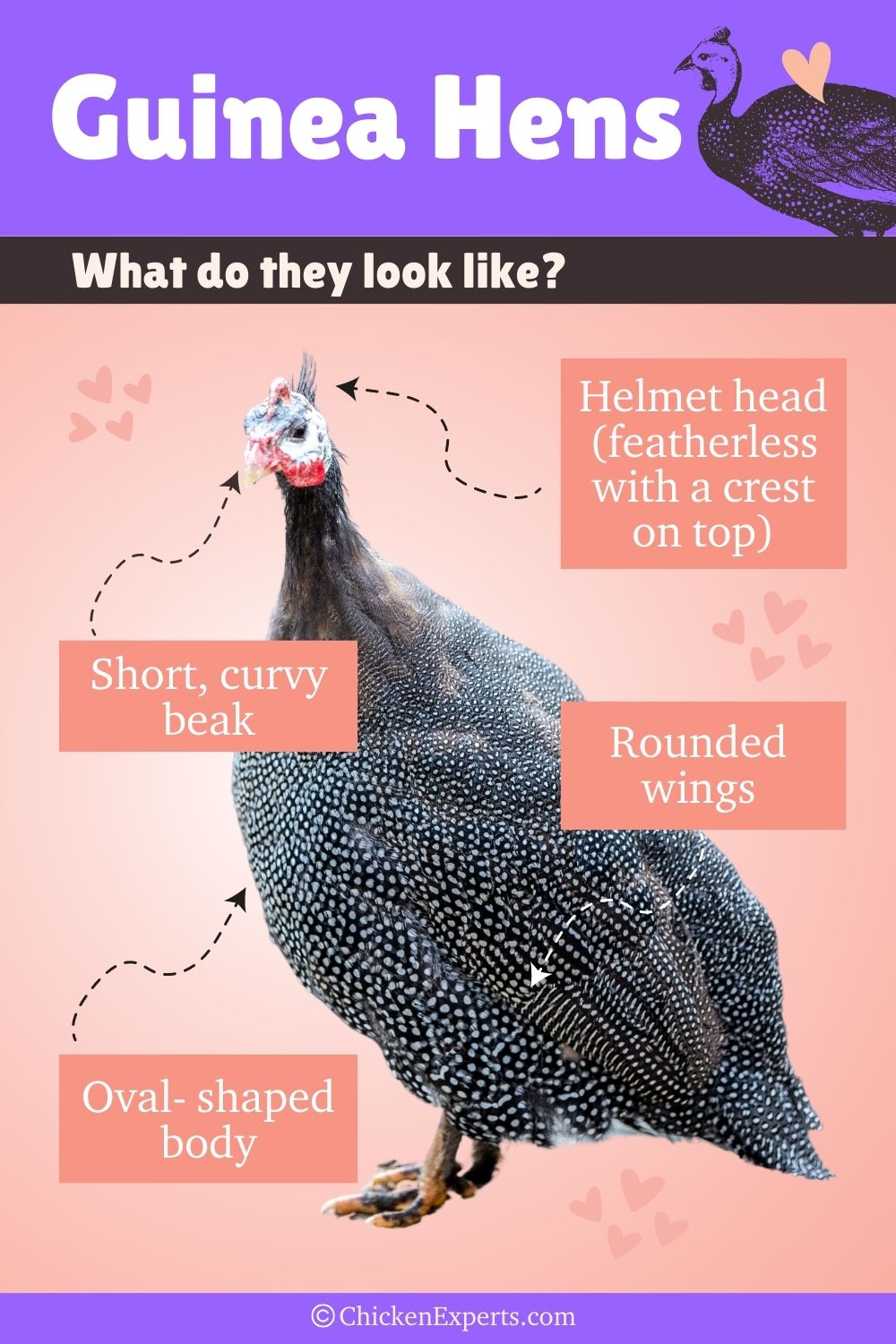
Guinea hens remind me of a miniature cassowary: they’re beefy-looking birds with funky facial tattoos. They have large oval bodies, rounded wings, and short, curvy beaks. They look more like a turkey than any other bird.
Guineas are stunning in their own, quirky way. They have such beautiful plumage and lusciously long eyelashes. The most common coloration is pearl grey; an iridescent slatey-colored base with tiny white pearly-polka dots.
How Big Are Guinea Hens?
Guinea hens are 53 – 58 cm tall, measure 40 – 71 cm in length, and weigh anything from 25 to 56 ounces when they’re fully grown. They have a massive 6-foot wingspan which is great for shooing away unwanted visitors!
Guinea hens look and act more like turkeys or pheasants than chickens, but size-wise they’re smaller than turkeys and larger than your average chicken.
Guinea Hen Varieties
There are several species of wild Guinea hen which are further categorized into four genera. Each species of Guinea has different habitat requirements and personalities, so it’s worth knowing your helmets from your plumes! There are also 20 different colors to pick from. Which Guinea will you go for?
In the US, it’s all about helmeted Guineas: the most common domesticated guineas in the US. You can’t miss them with their characteristic bony lumps on their heads which look like – you’ve guessed it – helmets.
Crested Guineas are known for their attitude! They are the angriest birds of the Guinea pack! If you have a fox problem, perhaps the crested variety is the guinea for you. Those curly mops may look cute, but crested Guineas are notoriously violent.
The vulturine Guinea is the largest of the lot but has the softest, tamest temperament. It’s also a bit of a wimp (in Guinea terms) and needs to be kept in larger groups to feel safe.
Guinea Hen Colors
Guinea Colors and patterns aren’t as distinct as chickens. You’ll see all sorts of gorgeous one-off combinations which makes every Guinea seem special.
In the US, only the Helmeted Guinea hen is formally acknowledged in either pearl, white, or lavender. They are just a tiny sample of the colors available to enjoy if you’re not bothered about showing them.
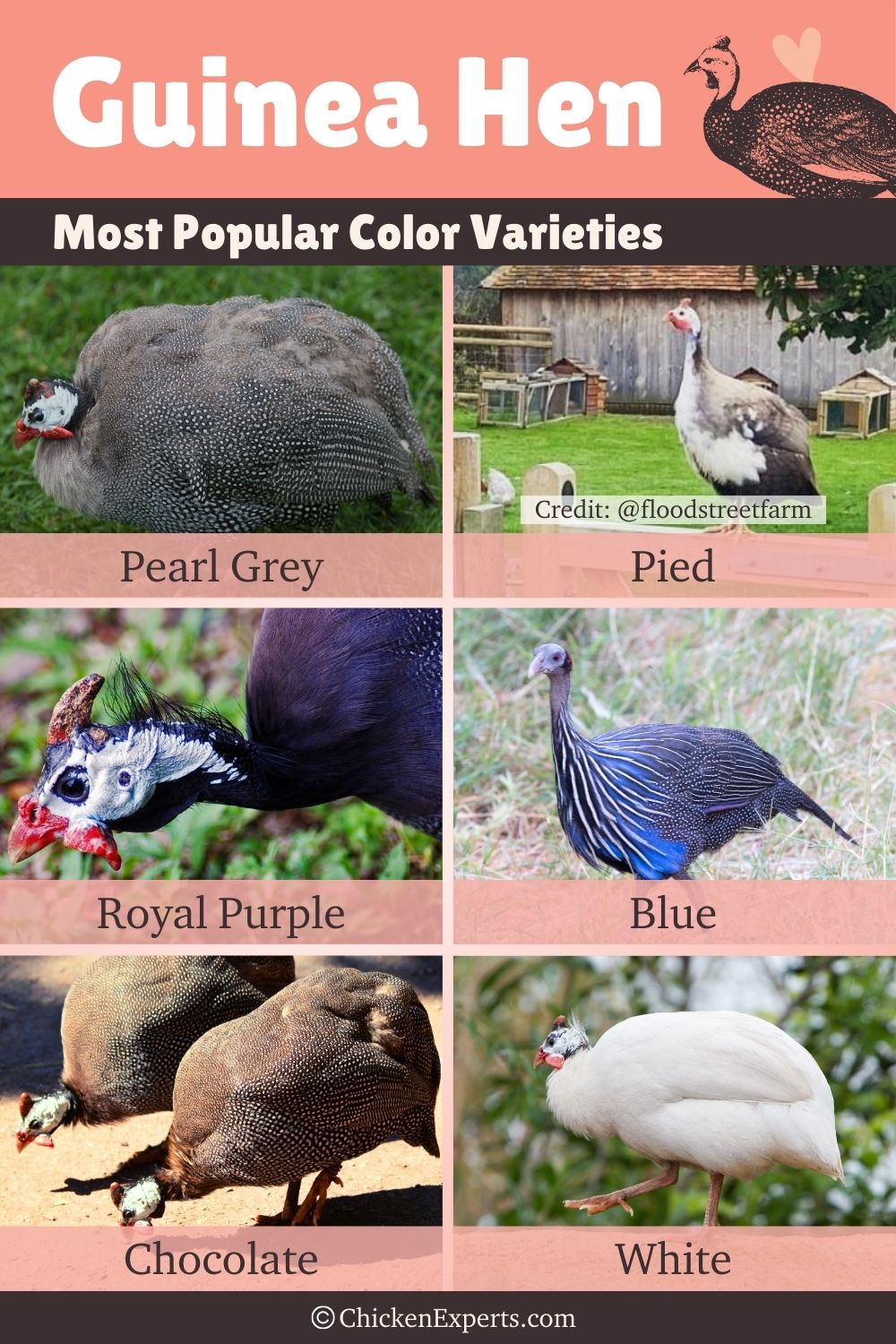
Read More About The 6 Most Popular Colors of Guinea Fowl, here.
Guineas are all a mix of blue, grey, brown, and white, but in true poultry fashion, these mixes have descriptive names:
• Pearl Gray
• White Pied (or splash)
• Porcelain
• Opaline
• Slate
• Brown
• Light Lavender
• Lavender
• Royal Purple
• Coral Blue
• Buff Dundotte
• Buff
• Powder Blue
• Sky Blue
• Chocolate
• Violet
• Bronze
• Pewter
• Blonde
Do Guinea Hens Go Broody?
Guinea hens make great sitters, but not they’re not the most cautious of mommas. If you don’t find those eggs – wherever she’s laid them this time – you’ll likely have a clutch of keets in a month which you’ll need to care for if you want to get them through their first two weeks of life.
Guinea hens are seasonal layers, and they tend to nest on the ground amongst bushes and leaves. They’ll diligently sit on clutches of up to 20 eggs for the 26-28 days it takes them to hatch. Daddy will patrol too, keeping Mummy and babies safe from unwanted visitors…including you.
Once those cute little keets hatch, Mum’s done her bit! She’ll probably run off exploring straight away and the keets that follow her will suffer from injuries and the damp grass. This is where you come in, but Guinea keets are so damn cute you won’t mind!
Guinea Hen Pairings
Guineas are pack animals. They like to be kept in a group, not alone, and will socialize – sometimes even mate - with larger chickens who can hold their own. But they can bully smaller, less aggressive birds.
Guinea hens will stick to one mate for life. It might sound romantic, but the commitment isn’t quite equal. Male Guineas will be ‘sticking’ to 4-5 females.
CARING FOR GUINEA HENS
How To Care for Guinea Hens
One of the Guinea’s plus points is that she doesn’t really need caring for! Guinea hens are very self-sufficient characters, which is great if you are happy to accept them as they come.
If you fail to read up on their quirky ways before introducing them to your homestead, then you are bound to fall fowl of a few Guinea bloopers!
What Do Guinea Hens Eat?
Adult guinea hens are so easy to feed. Just let them roam free! Guinea hens are such effective foragers that they’ll sort their own dinner. Feeding your adult guinea hen will cost you the same as the bugs in the ground– nothing!
How Much Space Do Guinea Hens Need?
Guinea hens shouldn’t be kept cooped up. Guineas need acreage to roam and they won’t take to confined spaces or smaller yards or gardens.
Guineas will prefer trees and bushes to nest in, but if they do accept your suggestion of a coop, make sure you give them a minimum of 3-4 square feet each.
Guinea Hen Health
A healthy Guinea hen will live for 10-15 years since they’re very hardy and healthy hens.
Their bald heads help them handle the heat, and they can handle themselves free ranging in hot and cold climates, they just need a little shelter.
Guinea hen keets are vulnerable to dampness and cold for the first couple of weeks of their life, but after that, they’ll be healthy, hardy birds too. Splayed legs – also known as Spraddle leg - can be an issue in keets, but it’s easily fixed if you know how.
Consuming a diet of bugs and beasts does put Guineas at increased risk of tummy bugs. Bacterial and gut illnesses can have rapid impacts on your Guinea’s health, so make sure you know how to care for your Guinea hen properly before you bring these hens home.
Where To Buy Guinea Hens
Here’s a brilliant resource from Guineas.com to help you find reputable Guinea breeders.
WHAT DOES YOUR GUINEA GIRL GET UP TO?
IS SHE AS TOUGH AS YOU EGG-SPECTED?
(Tell us in the comments!)
YUP. I NEED THESE GIRLS IN MY LIFE.
Got Guinea hen Fever? I don’t blame you one smidge. Just be warned that the dog might get a bit disgruntled when they show his security skills up. You snooze you lose, Rover.
Guinea hens have utterly nailed their niche in the poultry market. There’s no alternative to Guinea hens. If you need something like a Guinea hen, then you need a Guinea hen.
If Guinea hens have piqued your interest, then I’m betting my bottom dollar that you’re tackling a predator or a pest problem. Am I right?
For most people, Guineas are a way to support their laying hens. Knowing how to deter nasty nocturnal predators or protect your flock against pesky pests will make a massive difference to your outlook on keeping chickens.
Guinea hens aren’t the right solution for everyone, but there are lots of surprisingly savvy ways to safeguard vulnerable chickens, without locking them up all day!
Your next read should be Chickenpedia’s Poultry Predators course, or maybe their Mites and Lice course. I guess it depends on who’s ruffling your feathers the most!


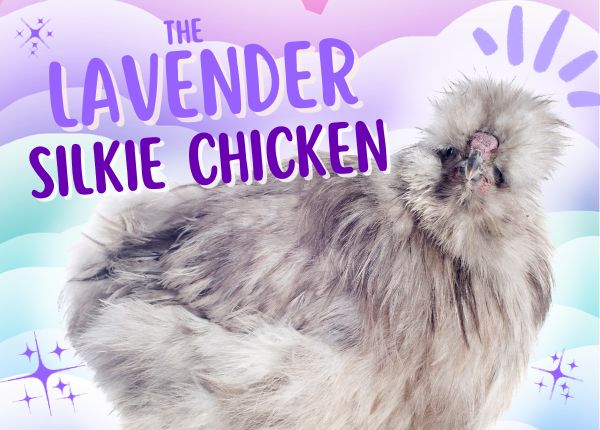
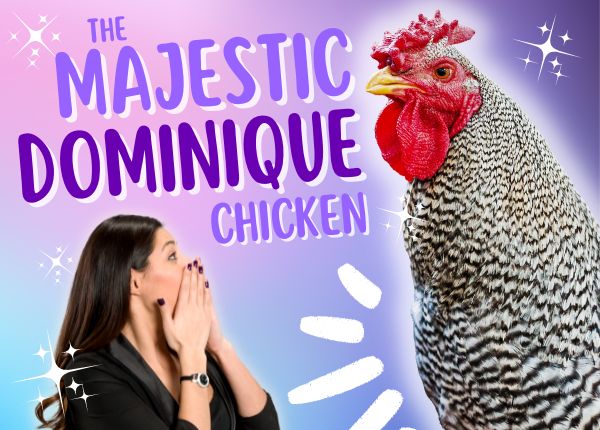



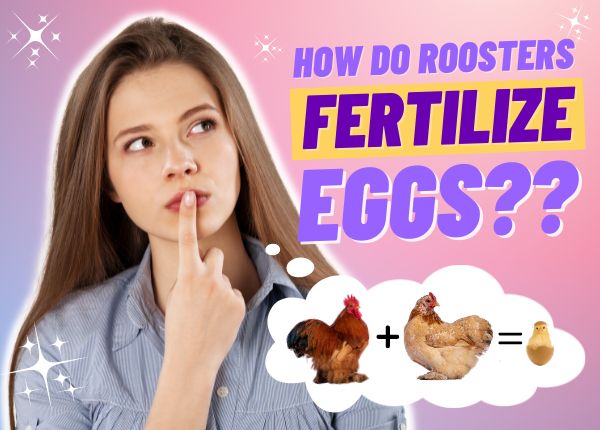



Leave a comment (all fields required)